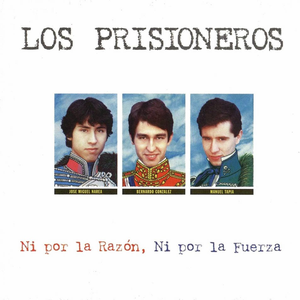The band started when Jorge González and Miguel Tapia decided to start their own band while being high school students. They were inexperienced but enthusiastic, after many practices and writing songs, they asked Claudio Narea if he would like to join them, and impressed by the music they were making, he accepted. Towards the early 80's they went through some name changes and before settling on "Los Prisioneros" they had the name "Los Vinchukas" as their original name. In 1983, they had played a number of local shows and that's when they met Carlos Fonseca, their future manager. Through him, they managed to score a record deal with Fusión Producciones.
In 1984, the band's debut album was released, with the hit song "La Voz De Los '80" (which was never a single). They reached acclaim in the radio and by the next year they would be touring. In 1986, their long awaited second album "Pateando Piedras" went double Platinum album in Chile. By that time, the group was invited to perform at Argentina's Chateau Rock Festival and later to a similar event in Montevideo, Uruguay. They continued touring and they became more successful mainstream wise.
The band disbanded in 1992, then as a quartet with additional members Cecilia Aguayo (keyboards) and Robert Rodríguez (guitar), since Claudio Narea had left the band earlier in 1990.
The original lineup of the band decided to get back together in 2001, offering two massive concerts in the National Stadium of Santiago, and then releasing "Los Prisioneros", their first original studio album in 13 years. However, internal problems between González and Narea led again to the departure of the guitarist in 2001. Los Prisioneros continued working as a duet with guest members like Álvaro Henríquez whom with they released a cover album. In 2004 two additional musicians joined the band: Sergio "Coty" Badilla and Gonzalo Yáñez, releasing their sixth album Manzana the same year. A little while after the release of the album band members decided to establish themselves in Mexico, attempting to get more international exposure. Yáñez decided not to leave Chile and left the band. After touring through several locations in North and South America, they finally disbanded in 2006.
King-Kong El Mono
Los Prisioneros Lyrics
Jump to: Overall Meaning ↴ Line by Line Meaning ↴
(C. Narea) 1987
A King-Kong no le gusta el jabong
A King-Kong le asusta andar en camiong
King-Kong es muy regalón
Hay un gorila llamado King-Kong
Todas las monas se mueren por él
Pero el las encuentra como la mona no más
Le gusta que le hagan "mi osito pachón"
No le gusta el pan con jamón
King-Kong es muy gilipollas
King-Kong toca muy bien el piano
Y goza comiendo bananos
Gusta de leer novelas pastoriles
Y revistas pornográficas también
King-Kong se cree capo
King-Kong dice que le pega a Tarzán
King-Kong es muy cachetón
King-Kong
El Mono is a song by Chilean band Los Prisioneros, released in 1987. The song tells the story of King-Kong, a gorilla who lives in the African jungle. King-Kong is portrayed as a demanding and picky character; he doesn't like bread with ham, but he enjoys playing the piano and eating bananas. He is adored by the female monkeys, who see him as attractive and fascinating, but he doesn't reciprocate their feelings.
The song's lyrics can be interpreted in many ways. One possible interpretation is that King-Kong represents a person who is arrogant and narcissistic, who wants to be adored but is incapable of love. The line "King-Kong se cree capo" (King-Kong thinks he's a boss) suggests that he is overconfident and egotistical. However, it's also possible to see King-Kong as a satire of popular culture icons or powerful figures who are praised for their superficial qualities, such as looks or charisma, rather than their actual accomplishments or virtues.
Despite its humorous tone, "King-Kong El Mono" also suggests a sense of alienation and isolation. King-Kong seems to be indifferent to the world around him, and he prefers his own company and comfort to the dangers and uncertainties of the outside world. The line "A King-Kong le asusta andar en camiong" (King-Kong is scared of riding in a truck) implies that he has a phobia or anxiety that prevents him from exploring new horizons. This theme of self-imposed captivity and fear resonated with many young people in Chile during the 1980s, who were living under a repressive military dictatorship and faced similar challenges of social and political isolation.
Line by Line Meaning
A King-Kong no le gusta el jabong
King-Kong doesn't like jargon
A King-Kong le asusta andar en camiong
King-Kong is scared of riding in a truck
King-Kong es muy regalón
King-Kong is very pampered
Hay un gorila llamado King-Kong
There's a gorilla named King-Kong
Que habita en medio de la selva africana
Who lives in the middle of the African jungle
Todas las monas se mueren por él
All the female monkeys die for him
Pero el las encuentra como la mona no más
But he just sees them as monkeys
Le gusta que le hagan "mi osito pachón"
He likes to be called "my fluffy bear"
No le gusta el pan con jamón
He doesn't like bread with ham
King-Kong es muy gilipollas
King-Kong is very silly
King-Kong toca muy bien el piano
King-Kong plays the piano very well
Y goza comiendo bananos
And enjoys eating bananas
Gusta de leer novelas pastoriles
He likes to read pastoral novels
Y revistas pornográficas también
And pornographic magazines too
King-Kong se cree capo
King-Kong thinks he's a boss
King-Kong dice que le pega a Tarzán
King-Kong claims he can beat Tarzan
King-Kong es muy cachetón
King-Kong is very conceited
Contributed by John H. Suggest a correction in the comments below.
